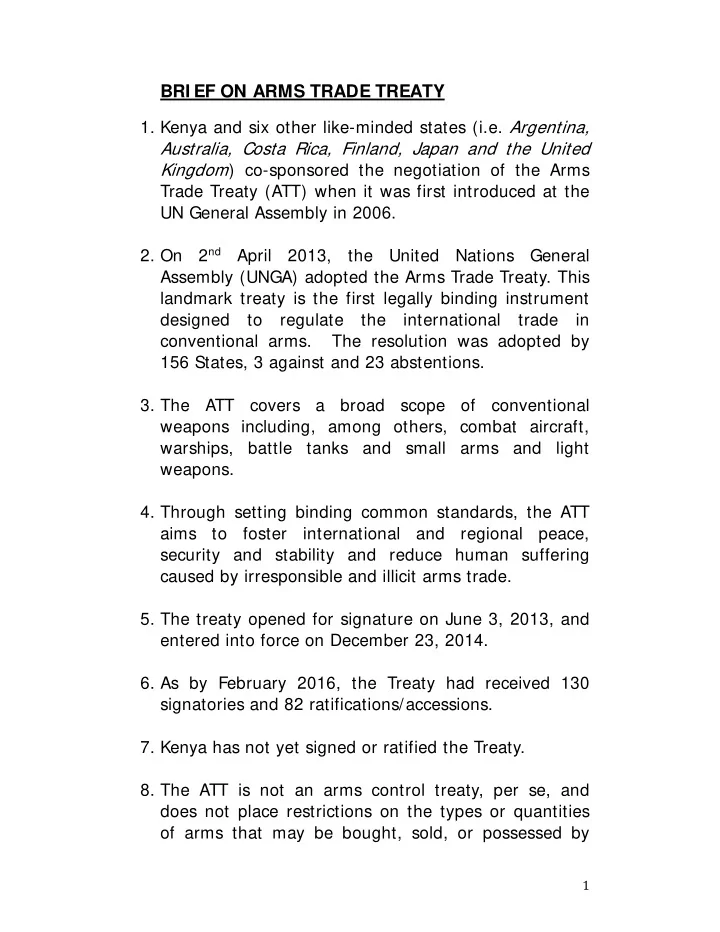

BRI EF ON ARMS TRADE TREATY 1. Kenya and six other like-minded states (i.e. Argentina, Australia, Costa Rica, Finland, Japan and the United Kingdom ) co-sponsored the negotiation of the Arms Trade Treaty (ATT) when it was first introduced at the UN General Assembly in 2006. 2. On 2 nd April 2013, the United Nations General Assembly (UNGA) adopted the Arms Trade Treaty. This landmark treaty is the first legally binding instrument designed to regulate the international trade in conventional arms. The resolution was adopted by 156 States, 3 against and 23 abstentions. 3. The ATT covers a broad scope of conventional weapons including, among others, combat aircraft, warships, battle tanks and small arms and light weapons. 4. Through setting binding common standards, the ATT aims to foster international and regional peace, security and stability and reduce human suffering caused by irresponsible and illicit arms trade. 5. The treaty opened for signature on June 3, 2013, and entered into force on December 23, 2014. 6. As by February 2016, the Treaty had received 130 signatories and 82 ratifications/accessions. 7. Kenya has not yet signed or ratified the Treaty. 8. The ATT is not an arms control treaty, per se, and does not place restrictions on the types or quantities of arms that may be bought, sold, or possessed by 1
states. It also does not impact a state’s domestic gun control laws or other firearm ownership policies. KENYA AND ATT 1. Kenya was among the seven United Nations member states that co-sponsored the negotiation of the ATT when it was first introduced at the United Nations General Assembly in 2006. The other six countries are Argentina, Australia, Costa Rica, Finland, Japan, and United Kingdom. 2. Throughout the long and many stages of negotiations of the ATT lasting nearly nine years, Kenya played a key and robust role in its realization. . 3. The Kenya Parliament, in close collaboration with Parliamentarians for Global Action in New York, along with other prominent Kenya parliamentarians, collected 50 signatures from members of the 10 th Parliament, affirming Kenya’s support for the adoption of an ATT. 4. These signatures, along with over 2,000 others from MPs in 114 parliaments worldwide, were presented in a public ceremony to UN Secretary General Ban Ki- Moon in New York in June, 2012. 5. Kenya continues to suffer the negative effects of unregulated trade in arms. Recent terrorist attacks and incidents of violence, including cattle rustling, banditry and other criminal activities, attest to the ever increasing need to close, through the ATT, the loopholes that permit criminals and terrorists to 2
acquire and use dangerous weapons that maim and kill innocent civilians. 6. Though the ATT will not solve all the problems of illicit trade in arms and weapons, it nevertheless, has the potential to see a major reduction in the flow of these weapons, which will be an important step in reducing global human suffering. 7. The Ministry of Defence and State Department of Interior however have not provided the green light for Kenya to accede to the Arms Trade Treaty. 8. In view of the growing threat to Kenya’s national security posed by the proliferation of small arms and light weapons and the easy availability of these arms to terrorist groups it is important that Kenya expedites the process of signature and ratification of the ATT. 9. The Attorney General had pronounced himself in a meeting on the ATT on 12 th October, 2015 that he strongly recommended to the Government of Kenya to accede to the Treaty. 10. The Ministry of Defence, however, while not against Kenya’s accession to the Treaty, had certain reservations that revolved around the practical implementation of the Treaty. 11. The reservations of the Ministry of Defence are around concerns that Kenya may not be quite ready to sign as the country could be accused of violation given our engagement in Somalia. 3
12. It was therefore Ministry of Defence’s suggestion that Kenya accedes to the Treaty with reservations (provided for by Article 25 of the Treaty). 13. That notwithstanding, Kenya as a Country wishes to be party to this global process and is in the process of formulating the signing and accession to the Treaty. 14. An Inter-ministerial sub-committee from relevant Ministries has been tasked in November 2015, to review possible reservations and recommendations to enable Kenya to sign. 15. The position of the Ministry of Foreign Affairs and International Trade remains that signing is more beneficial for Kenya given that the country suffers a lot from proliferation of small arms and light weapons. MI NI STRY OF FOREI GN AFFAI RS & I NTERNATI ONAL TRADE MARCH, 2016 4
Recommend
More recommend